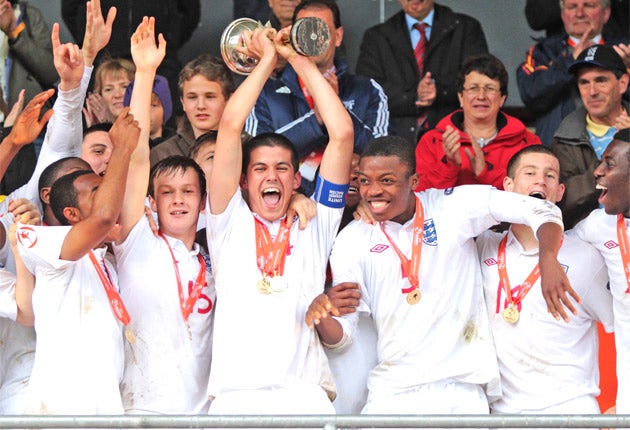True, 2010 World Cup was dire, says FA... but just watch out come 2018
There is optimism for the future after a year of achievement for England's junior sides

Thirty-eight victories to nine defeats, a European Championship trophy lifted, a last-four finish in another Continental finals, qualification secured for two major tournaments. Were it not for one unfortunate, and rather high profile exception, the Football Association could be proud of its representative teams' performances during 2010.
The exception, of course, is the flagship national team: the one with the £6m-a-year foreign coach. Since returning from South Africa in disgrace, the first XI have even been outclassed at Wembley by one of the few teams to endure an even more embarrassing World Cup.
But the FA sought to look forward, not backwards, yesterday. When Sir Trevor Brooking, the FA's director of football development, held court at Wembley, the talk was of Jack Wilshere and Josh McEachran, Connor Wickham and Ross Barkley, not the fading "golden generation".
"No one is pretending the World Cup went well," said Adrian Bevington, the chief executive of Club England, "but the picture is not all doom and gloom. There is progress being made at younger levels and reason to be optimistic."
In 2010 the Under-21s, under Stuart Pearce, qualified for next summer's European Championship finals. They will hope, in Denmark, to go one better than in 2009 when they reached the final before losing to a German side that supplied several players to the World Cup semi-finalists, including Mesut Ozil and Sami Khedira. The U19s, under Noel Blake, reached the semi-finals of the European Championships, before losing to Spain. In doing so they qualified for next year's U20 World Cup. The U17s provide the greatest source of hope. Under John Peacock, the type of career coach often derided in English football's "show-us-your-caps" mentality, but who clearly knows what he is doing, they won the European Championships, defeating France and Spain en route. Indeed, in the calendar year the U17s won 17 of their 21 internationals, drawing the other four.
"The U17s", said Brooking, almost purring as he spoke, "proved it can be done. We can play through the thirds [defence, midfield, attack]; we can produce decision-making players capable of playing different formations; we can put 10 technical players on the pitch who are all comfortable in possession – and a goalkeeper, he has to use his feet today, too. They showed it is nonsense to claim our players cannot play football this way because of the way they are brought up.
"In 2009 we reached final tournaments at U21, U19 and U17 level. We sent a study group to watch all those tournaments and the verdict was that not enough of those players would become senior internationals. This U17 team has a lot of players who have a real chance. They showed we can produce players as good as anyone. What we have not been doing is producing enough depth but this year has depth. What we don't know yet is whether this is evidence that the academy system is working, or is it just a good year?
Brooking was reluctant to pick out individuals but he spoke glowingly of McEachran and Wickham, who already have first team experience at Chelsea and Ipswich, and also the likes of Barkley (Everton), Andre Wisdom (Liverpool), Nat Chalobah (Chelsea), Benik Afobe (Arsenal) and others. The encouraging aspect was the range of clubs involved. Spain are the benchmark for everyone at youth level, as in the senior game, but a huge proportion of their players are being developed by one club, Barcelona.
Each age group is involved in international competition next year (including the U20 group which only comes together for the World Youth Cup). The main age-ranges, U17, U19, U21, all face Spain. "We mustn't be afraid of it," said Brooking. "They are terrific, but the U17s beat them."
The majority of that U17 team has been fast-tracked to U19 level, which means they are unlikely to emerge from their elite qualifying group this year, but will be real contenders next year. There is a caveat. As the ages rise it becomes increasingly difficult for the FA to gain player release. This is mandatory in Spain but the conflicts of interest in English football means the FA (which is part-controlled by the clubs) dare not insist. This results, for example, in 40 players being unavailable for the 2009 World Youth Cup. England went out without scoring a goal, beaten 4-0 by Ghana, defeated by Uruguay, and held to a draw by Uzbekistan. "Tournament football is different and it is a valuable experience for players," said Brooking "but we are not in a strong position and need to work with clubs."
The FA will thus prioritise tournaments, with the U21 tournament next year's focus. Longer-term World Cup 2018 is the goal, even if it is in Russia, not England. "Brazil in 2014 will be very difficult for any European country," said Brooking, "but in 2018 the U17 group will be in their mid-20s. They have a real chance."
England's 2011 schedule
Under 21 European Championships, Denmark, 11-25 June
Under 20 World Cup, Colombia, 29 July-20 August
Under 19 European Championships
Romania, 20 July-11 August. (To qualify England must win their elite round qualifying group which includes Spain, Switzerland, Montenegro).
Under 17s European Championships
Serbia, 3-5 May. (To qualify England must win their elite round qualifying group against Spain, Belgium, Northern Ireland. World Cup, Mexico, 18 June-10 July. To qualify England must finish in the top three in the Euros).
Join our commenting forum
Join thought-provoking conversations, follow other Independent readers and see their replies
Comments
Bookmark popover
Removed from bookmarks